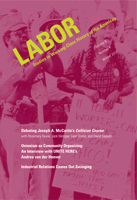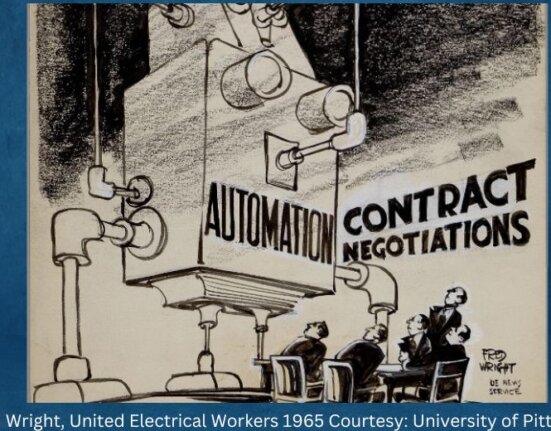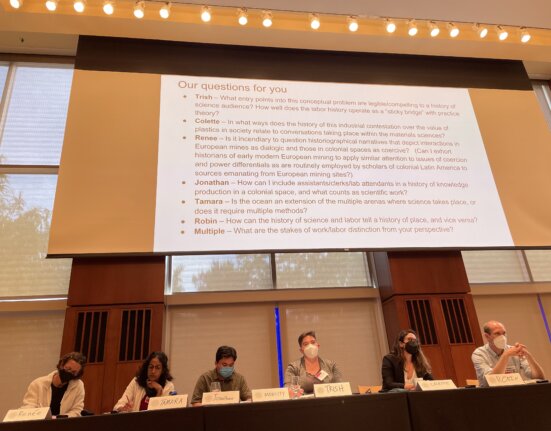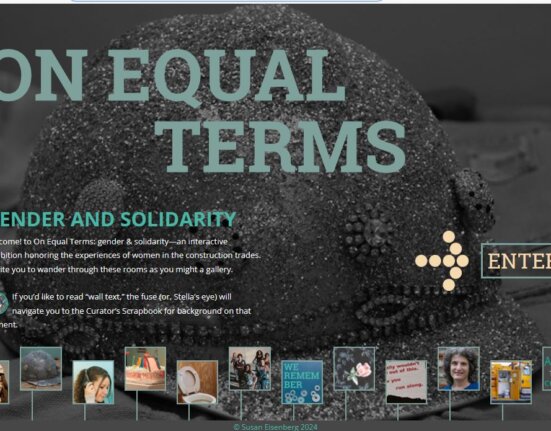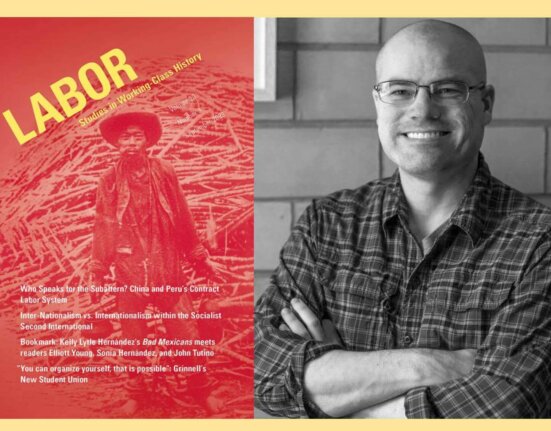In This Issue
The Common Verse
- Jeanne Bryner, “Silence Gives Consent“
LAWCHA Watch
- Cecilia Bucki, “LAWCHA/OAH Meeting in Milwaukee: Looking Ahead“
Contemporary Affairs
- Nancy MacLean, “Community Partnerships: Hope for an Embattled Labor Movement? A Conversation with Andrea van den Heever”
Contributing editor Nancy MacLean sits down with the remarkable union organizer Andrea van den Heever. A white South African who fled the apartheid regime, van den Heever fortuitously landed a secretarial job at Yale University in 1982, just as HERE’s organizing drive among clerical workers was getting off the ground. Soon she had been recruited to a struggle that has never let go of her, first as local steward, today as director of Community Organizing Project for the international union. In wide-ranging reflections with MacLean, van den Heever identifies both the strategies and sensibilities at the core of modern-day unionism as social movement. Among the many highlights of her account is the conceptual link she envisioned between the Freedom Charter in South Africa and the New Social Contract among New Haven workers; her emphasis on the need for twinned attention to African American and Latino community concerns; and the role of both clergy and student and faculty supporters in helping balance an uneven playing field in organizing campaigns.
Bookmark
- Leisl Orenic, “The Other Side of the Radar: PATCO and the Airlines“
This issue’s Bookmark section focuses on Joseph A. McCartin’s Collision Course: Ronald Reagan, the Air Traffic Controllers, and the Strike that Changed America. While drawing raves for the power of its narrative and depth of research, McCartin’s work also attracts questions and criticism from a range of well-informed commentators. Liesl Orenic wonders about the connections, real or fatefully missed, between the controllers and other workers and unions in the airline industry. Former controller David Sapadin emphasizes the impact of new automation systems on the controllers’ work process as an underacknowledged factor in the 1981 strike defeat. Jack Metzgar gratefully leans on McCartin’s careful storytelling to tease out a counterfactual narrative — i.e., a victory that would truly have “changed America” — but as the PATCO strike unfolded, Metzgar doubts it had much impact on the strikebreaking paradigms of the 1980s. Rosemary Feurer, in turn, seeks to rescue the creative and even heroic strains of resistance in the controllers’ initiative, challenging the message that McCartin’s readers may derive that impetuous union leaders led their members over a cliff. McCartin, of course, has the last word.
- David Sapadin, “How Automation Took Command“
- Jack Metzgar, “Right Answer, Wrong Question“
- Rosemary Feurer, “A Struggle of Biblical Proportions“
- Joseph A. McCartin, “Response“
Roundtable
- Michael Hillard, “‘The End of Collaboration’: Industrial Relations’ Re-engagement of the Labor Question and Progressive Labor Policy Activism”
This roundtable is a frank state-of-the-field discussion by leading scholars of industrial relations. Whereas the decline of organized labor has likely helped push labor history into new arenas of inquiry, the near-collapse of collective bargaining represents a more existential threat to the discipline of industrial relations. In the event, as four experts attest, the “mother field” or industrial relations – labor economics is now looking to its labor history offspring as one source of re-inspiration. Following Michael Hillard’s introductory overview, Thomas A. Kochan, Rosemary Batt, and Richard McIntyre set the current crisis in the context of the dispersion of both the institutional economics of the long New Deal era as well as the class-collaborative “Japanese” or “Saturn Motors” models of workplace efficiency that (briefly) succeeded them. A more combative policy agenda together with a Marxist-inspired theoretical critique—both looking to connect with labor history scholarship—has most recently come to the fore.
- Thomas A. Kochan, “Calling All Academics: Engage in Current Labor and Employment Policy Debates“
- Rosemary Batt, “Collaborating to Inform a Progressive Labor Agenda“
- Richard McIntyre, “Radical Labor Economics, Labor History, and Employment Relations: The State of the Conversation“
Media Review
- Steve Striffler, “Undercover Boss: CBS reality television series“


